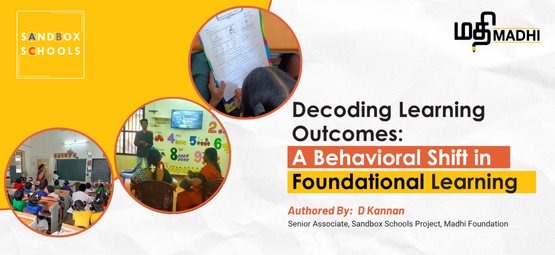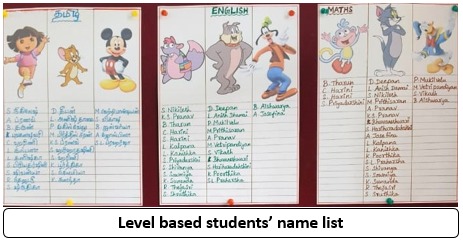
Decoding Learning Outcomes: A Behavioral Shift in Foundational Learning
Introduction:
The Madhi Foundation’s work is shaped by a strategic vision: “Foundational learning first, so every child can thrive.”
Achieving foundational literacy and numeracy (FLN) across government schools in Tamil Nadu requires a comprehensive approach that influences mindsets, practices, and understanding at every level of the education system. The real puzzle piece? Empowering teachers to truly understand what learning outcomes mean — for children and for themselves.
This understanding emerges through reflective practice, honest assessments, and a willingness to unlearn and relearn. This is the deep, regenerative work of behavior change that Madhi Foundation is committed to — essential to achieving foundational literacy and numeracy (FLN) across every government school in Tamil Nadu.
To drive this shift, Madhi anchors its efforts in two core initiatives among others:
- The Sandbox Project — a set of model government schools where new ideas are piloted with teachers and students to assess what’s feasible and effective in practice.
- The State Project Management Unit (SPMU) — a strategic team that supports the Ennum Ezhuthum (EE) mission at the policy level through training, content, assessments, and systems design.
Together, these initiatives create a powerful feedback loop — from ground realities to state-level strategy — enabling Madhi to transform both mindsets and mechanisms.
The SPMU: Framing the System for Foundational Learning
The Ennum Ezhuthum Mission aims to ensure that by Academic Year 2025, all students in Grades 1 to 5 in Tamil Nadu’s government schools can read with comprehension and perform basic arithmetic. To achieve this, the State Project Management Unit (SPMU) plays a critical role.
The SPMU designs the mission’s overarching strategy — from teacher training frameworks and learning materials to monitoring tools and assessments. It works closely with institutions like SCERT, DIETs, and education administrators to build capacity, define clear learning indicators, and ensure implementation across districts.
But to make these strategies meaningful, they must be rooted in what works for teachers and students. That’s where the Sandbox Project comes in.
The Sandbox Project, run in Greater Chennai Corporation schools, serves as a real-time lab to test and refine teaching practices that align with the EE mission. The project supports teachers in understanding, applying, and adapting the mission’s core strategies to their classroom contexts.
One key area of focus is level-based instruction, where students of Grades 1,2 and 3 are grouped into three learning levels — Arumbu, Mottu, and Malar — based on their current learning levels, not their grade. Where,
- Arumbu – Level 1 – Equivalent to Grade 1 (Read and write letters & single digit numbers)
- Mottu – Level 2 – Equivalent to Grade 2 (Read and write words & two-digit numbers)
- Malar – Level 3 – Equivalent to Grade 3 (Read and write sentences & three-digit numbers)
Seeing is believing – and transforming
In August 2024, the Sandbox team conducted a School Team Meeting (STM) on “Level-Based Grouping and Instruction.” Teachers used a simple, objective tool to assess students in Tamil, English, and Math. This allowed them to observe each student’s actual learning level, not just rely on assumptions.
The experience was eye-opening. One teacher, who had confidently assumed several students as “Malar level” (Grade 3 equivalent), realized through the assessment that some of them couldn’t even identify Tamil vowels. The teacher reflected, “I thought Malar meant reading sentences even with letter-by-letter decoding. But now I understand they must read fluently as sentences. In that case, only a few in my class are truly at Malar level.”
These realizations came from engaging with the objective assessment tools, seeing the evidence, and being supported to pause, reflect, and recalibrate.
Why This Matters: Behavior Change as the Missing Link
Helping a teacher genuinely understand what “learning” looks like for a child — and adjust their teaching accordingly — is not a technical task. It is a behavioral one.
We often talk about improving teaching practices, but we don’t always talk about what it takes for those practices to change. The truth is:
Many teachers instinctively want to show their students are doing well. During assessments, they may overestimate a student’s level because they want to affirm their teaching efforts. This is understandable and relatable. But in the context of learning, this can obscure a child’s real needs.
The Sandbox team learned that it’s not enough to give teachers a rubric or tool. What’s needed is space and support to help them reflect honestly on what they observe, and why. This is where deep, regenerative behavior change begins — by building trust and clarifying expectations.
And it’s working. In Sandbox schools, three out of six teachers began creating and displaying level-based student groupings based on objective assessments in their classrooms. Their instruction, while still evolving, is now rooted in what their students can actually do, not just what they hope they can do.

From Classrooms to Policy: A Feedback Loop for Systemic Change
While the Sandbox Project works closely with teachers and students, the insights it generates are fed back into SPMU’s policy and training efforts, shaping the next phase of Ennum Ezhuthum’s strategy.
This dynamic between practice and policy is a cornerstone of Madhi’s approach. The SPMU defines structures and expectations; the Sandbox tests their working on the ground. This back-and-forth ensures that the mission’s design is grounded.
It also illustrates a core belief of Madhi Foundation:
Systemic transformation in education is only possible when top-down policy and bottom-up behavior change meet in the middle.
Helping teachers decode what learning outcomes really mean — not just in theory, but in their own classrooms — is slow, deeply human work. It involves challenging assumptions, sitting with discomfort, and choosing honesty over optics.
But this is the work that matters most. Because only when teachers understand what their students can and cannot do — and feel safe enough to name it — can we truly start to build learning pathways that work for every child.
Madhi Foundation’s commitment to Foundational Learning is about helping people — especially teachers — see more clearly, teach more meaningfully, and believe that real change is possible.
And in that journey, decoding learning outcomes is the starting point of transformation.
Kannan is a development professional and an eager learner. He currently works as a Senior Associate in the Sandbox Schools project team at Madhi Foundation.
